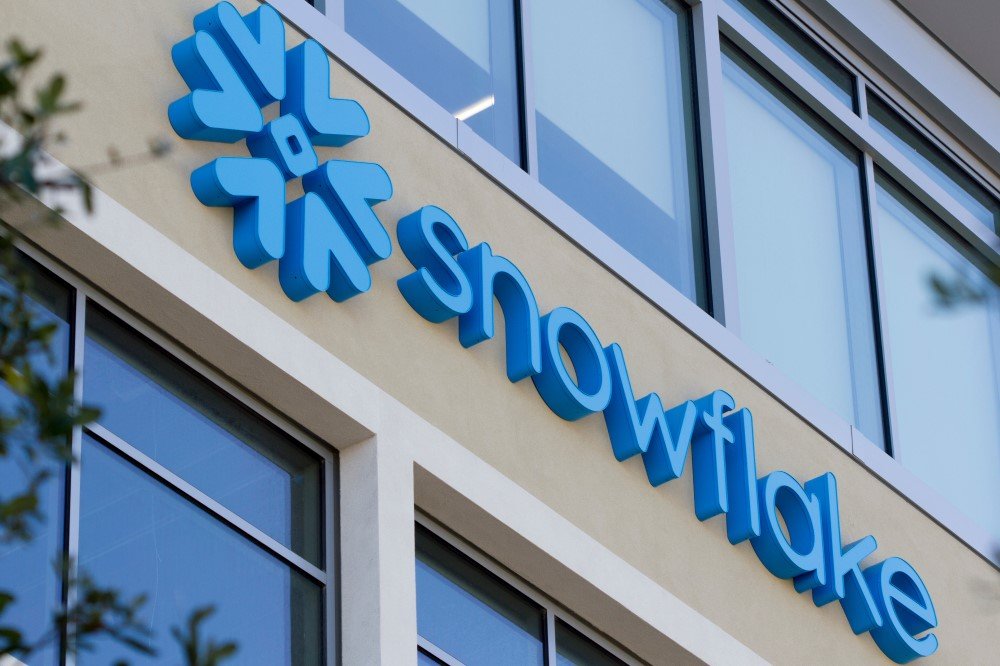Snowflake Salary Negotiation: How to Negotiate a Snowflake Job Offer
Receiving a job offer from a leading data storage, processing, and analytics solutions company like Snowflake is an impressive achievement. As a data cloud leader, Snowflake careers can offer professionals the opportunity to work on some of the most innovative cloud technologies out there.
While you should definitely feel proud for landing an offer to start your Snowflake career, you probably shouldn’t accept it immediately. Why? You’d be missing out on negotiating for a better offer and improving your overall career earnings.
Even though Snowflake offers competitive compensation packages similar to other large tech companies, negotiating your offer is still something highly worth considering. In fact, we want you to know that negotiating for a better job offer with Snowflake is possible—and we’ve done it many times.
Over the years, our clients have used our negotiation strategies to secure improved pay packages at Snowflake and we want to share these insights and tips with you. In the following article, we will go over our step-by-step guide for a Snowflake salary negotiation to help prepare you to negotiate your offer with confidence and success.
Want to Negotiate Your Snowflake Offer? Get offer-specific guidance from a Snowflake Salary Negotiation Coach. We help career professionals negotiate competitive job offers.
Or leverage our Salary Negotiation Courses and Salary Negotiation Templates.
 Job Offer Negotiation Course
Job Offer Negotiation Course
- Get our job offer negotiation strategies, templates, scripts, and guidance.
- Access our step-by-step lessons, compensation research guides, and tools.
- Access Now
 Raise Negotiation Course
Raise Negotiation Course
- Get our raise negotiation strategies, templates, scripts, and guidance.
- Access our step-by-step lessons, compensation research guides, and tools.
- Access Now
Understanding the Compensation Components of Snowflake Salary
The first step to any negotiation involves taking a deep dive into all of the different components of your compensation package.
Even though Snowflake offers compensation packages similar to other large tech companies, there are still a few key differences. Taking the time to evaluate each of the different elements of a Snowflake compensation package will allow you to calculate your total compensation (your total annual take home pay) accurately. Without understanding how each of these individual components work, you won’t be able to negotiate them successfully.
Too often in the job search and interview process, candidates only focus on base salaries and fail to consider the other elements that make up compensation packages. The truth is that most job offers include a wide range of compensation components and benefits on top of the standard base salary, and these elements can make a huge difference in your total earnings.
For example, a salary package at Snowflake will include a base salary, a performance bonus, and an initial equity grant as well as many other valuable benefits and perks. The only element you will not find is a Snowflake signing bonus, which differs from most other tech companies. For example, here’s what the total compensation may look like in an initial offer for a Snowflake software engineer salary:
Snowflake Software Engineer Salary
Now that you know how important it is to understand all of the components of your job offer, let’s spend some time breaking down each of the elements of a Snowflake compensation package.
Snowflake Salary
Let’s start with the compensation component you’re probably most familiar with: your base salary. A Snowflake bas
e salary is what it sounds like—it’s the guaranteed fixed pay you receive in exchange for the work you do. The only time your Snowflake salary would change is if you receive merit increases or a promotion; otherwise, your base salary will always stay the same.
What you might not be as familiar with, however, is how your Snowflake salary is determined. Like most tech companies, Snowflake has predetermined salary ranges for each of their specific job roles. Each of these ranges have set minimum and maximum amounts associated with them that your Snowflake base salary can fall within. For example, the ranges for a senior Snowflake software engineer salary will look different from the ranges for a staff Snowflake software engineer salary. Even job offers at the same level will have different ranges depending on their specific roles (i.e., a Snowflake data scientist salary vs. Snowflake solution architect salary).
So why does paying attention to these pay bands matter? Well, it’s very possible that the base salary you’re initially offered may be at the lower end of the preset pay range for your specific role. If you know what the salary range is for your role, you’ll then know that you can negotiate for a higher Snowflake base pay.
Snowflake Performance Bonus
Your compensation package at Snowflake will also include an annual performance bonus. This bonus is a percentage of your base salary and is based on both company and personal performance. The target percentage for a Snowflake performance bonus will range between roles and levels, but it’s usually around 15% for most levels. It’s important to clarify what the actual payout will be with the hiring team to ensure you have an accurate expectation before you begin. That way you can confirm what their team hits each year historically (i.e., you wouldn’t want to expect the full payout if the team usually only hits 60% of their target each year).
The Snowflake performance bonus is not negotiable, but it is a percentage of your base salary—so if you successfully negotiate your Snowflake base salary higher, your performance bonus will also increase.
Snowflake Equity Package
The next part of your offer we will cover is the Snowflake equity package. This equity element is where our clients have made some of the biggest improvements to their total compensation during their negotiation.
Equity is a key compensation component that drives most job seekers to tech companies, including Snowflake. New employees at Snowflake will receive an initial equity grant in their job offers, which comes in the form of restricted stock units (RSUs). These RSUs represent actual stock (i.e., you will receive shares of SNOW stock) that you will own when the stock vest. Snowflake RSUs share some similarities with the Microsoft vesting schedule, where they have a four-year vesting schedule with an initial one-year cliff. This means you’ll get your initial stock vest (25%) one year after the vesting start date and then your RSUs will vest quarterly (6.25%) over the remaining three years.
The odd thing about Snowflake equity is that it does not start vesting on your first day. Instead, the vesting start date will be delayed and will depend on your start date. If your first day is in December, January, or February, then the vesting period will start in March. If your first day is in March, April, or May, it will start in June. If your first day is in June, July, or August, then it will start in September. And finally, if your first day is in September, October, or November, then it will start in December. This is so that Snowflake’s quarterly vest dates all fall within March, June, September, and December of each year. This is something to pay attention to because it can take up to one year and three months to get your first vest with the company.
While Snowflake RSUs can be a large portion of your future compensation, don’t forget that they will fluctuate with the market value of Snowflake. In other words, if the SNOW stock is doing great, you share in that success, but if they don’t do great, you’ll see that reflected in your Snowflake RSU value.
Snowflake Signing Bonus
As briefly mentioned before, there will be no Snowflake signing bonus in your job offer. Common at many other companies, a hiring bonus is a compensation perk that is offered to cover lost compensation (unvested equity, bonuses, etc.) at your current company and to provide an incentive to join the new one. For example, you would receive a onetime TikTok sign-on bonus if you joined their team or an Amazon sign-on bonus in both your first and second year if you worked there.
Instead, Snowflake only offers a base salary, performance bonus, and initial equity package in their job offers. Regardless of how hard you push it is highly unlikely that you will receive a Snowflake sign-on bonus.
Snowflake Employee Benefits and Perks
As part of your compensation package, you’ll also receive decent Snowflake employee benefits and perks, which not only include health and other core benefits that you’d expect from a leading technology company, but also an ESPP program and flexible PTO program. Something that is shocking is that they do not provide a company match within the Snowflake 401K program so be aware of this retirement perk that is missing. While these Snowflake perks are typically non-negotiable, we still suggest digging into them during the due diligence phase of the negotiation process.
Five Key Steps for How to Negotiate a Snowflake Job Offer
In this section, we are going to walk you through five easy-to-follow steps for how to negotiate a snowflake job offer. However, before we do so, there’s something critical for you to note: you should almost never begin this negotiation process before you have received an official offer.
Like other companies, Snowflake is known for trying to pry about your salary expectations before they extend an offer and you don’t want to jeopardize your chances of receiving a better compensation package by providing your salary expectations on application forms or to the recruiter. You’ll always have more leverage once the hiring team has chosen you as the ideal candidate for the role and you have an offer in hand.
In the following section, we have outlined our five key steps and strategies for a successful Snowflake salary negotiation. This approach is based on our experience helping hundreds of career professionals negotiate for improved offers. While these are the key steps to a Snowflake salary negotiation, we strongly recommend you work with a Snowflake Salary Negotiation Coach to ensure success in your Snowflake offer negotiation by getting all of our strategies.
1) Understand the Components of Your Snowflake Salary
This first step in negotiating your Snowflake offer letter should be an easy one since we’ve already gone over it. As a quick reminder, make sure that you understand each of the elements that make up your total compensation before trying to negotiate your offer. If you need help identifying your total compensation then you can use our total compensation calculator to help you lay this out.
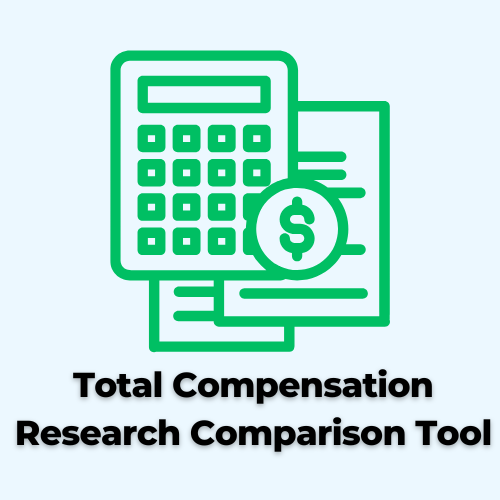
- Understand Total Compensation – Use our tool to break down and calculate the compensation in your job offer.
- Research & Compare Offers – Organize your compensation research and determine the right counter amount.
- Get Here
2) Complete Due Diligence on Your Snowflake Offer Letter by Asking the Right Questions
By this point, you’ve probably noticed how important it is to understand all of the ins and outs of your Snowflake offer letter before you start officially negotiating. And one of the best ways to do this is by asking the recruiting team strategic questions. In asking the right questions, you show the team how much you value the opportunity and how seriously you are considering the offer.
Asking the right questions will also give you the insight and data points you need to develop an effective Snowflake counteroffer. Even if you think you already know what they are going to say, it never hurts to confirm.
Even though you might want to take some time to think over the offer after first receiving it, we recommend not sitting on the offer and starting to ask questions within 24-48 hours. This shows the recruiter that you’re actively interested in understanding and pursuing the role. If you’re not sure what to ask, you can use our list of Strategic Questions to Build Negotiation Leverage.
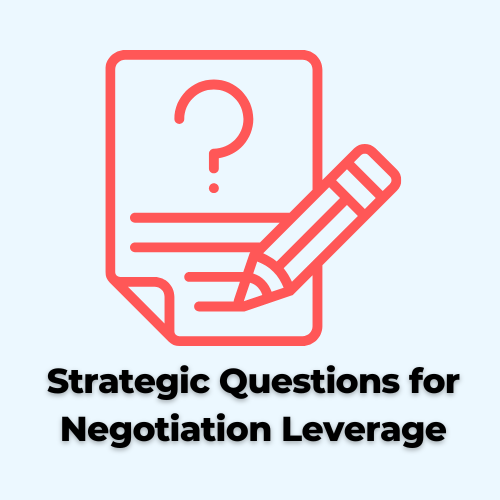
- Build Negotiation Leverage – Ask the right questions to strengthen your negotiation before sending a counter.
- Email & Phone Scripts – Get our list of questions to ask and what to say if the recruiter wants to chat through them.
- Get Here
3) Research to Identify What Your Snowflake Compensation Should Look Like
Like we mentioned earlier, Snowflake compensation is generally determined by salary ranges for specific roles. To understand the strength of your current offer and how much you should counter for, we recommend you spend some time investigating compensation data to better understand your role’s specific pay range.
Remember: these salary ranges are dependent on the role, its level, and even its location. So you’ll need to take all of these considerations into account to find the most accurate information. For example, you wouldn’t want to come to the table with data on a standard Snowflake software engineer salary if your offer was actually for a Snowflake senior security engineer salary.
So where should you look for the best pay data? Sites like Glassdoor and PayScale can give you helpful insights into salaries and other compensation components at Snowflake. However, remember that the publicly recorded pay ranges you see on these sites may not reflect all compensation components correctly, especially given changes in compensation from year to year (i.e., if you see data on Snowflake Levels fyi boasting high total comp it might be due to equity appreciation and not what they typically offer a new hire). Looking at data from multiple sites can help you compile the most accurate information.
Once you’ve identified the compensation range for your specific role, we recommend that you shoot for the mid-to-top end of that range during your Snowflake job offer negotiation. You can download our Total Compensation Research Comparison Tool to help you with your Snowflake compensation research.

- Understand Total Compensation – Use our tool to break down and calculate the compensation in your job offer.
- Research & Compare Offers – Organize your compensation research and determine the right counter amount.
- Get Here
4) Send a Snowflake Counteroffer to the Recruiter
Now comes the exciting part—sending over your Snowflake counteroffer!
Once you’ve prepared for the negotiation by completing the three steps above, you should be ready to send over your Snowflake salary negotiation counter. This is your opportunity to highlight what you would bring to the team and to advocate for the compensation you deserve.
When you present your Snowflake counteroffer to the recruiter, make sure to include references to the pay research you’ve conducted. Respectfully communicate how the benefits in your initial offer differ from other companies and/or your current role. While you can conduct your Snowflake counteroffer over the phone, we usually recommend using email. Email ensures everything is in writing, minimizes the risk of you going off topic, and it also gives the recruiter something tangible (and accurate) to share with the hiring team.
Make sure to be firm, courteous, and professional throughout the entire negotiation. Since you’re not an employee yet, this is your chance to highlight how you’d act once an official member of their team.
Check out our Counteroffer Drafts for examples if you need help formulating a strong and effective Snowflake counteroffer.

- Proven Counteroffer Templates – Built from hundreds of successful job offer negotiations.
- Negotiate with Confidence – Remove the guesswork with our professionally crafted counteroffers.
- Get Here
5) Handle Any Objections from the Snowflake Recruiter
Once you submit your counteroffer, it’s possible that the recruiter will immediately come back with an updated offer—however, it’s not very likely.
The more likely scenario is that the recruiter will return with a list of excuses for why the hiring team cannot make any adjustments to your Snowflake compensation package. If this happens, don’t panic; it’s a very normal part of the process.
If you do receive a “No” to your Snowflake counteroffer, begin by respectfully acknowledging their limitations. However, you should then restate your ask and desire for them to share your counteroffer with the Snowflake team. Even if they insist their team will simply say no, you should still stick to this approach—so be prepared to face a few objections and just follow our Objection Handling Scripts.
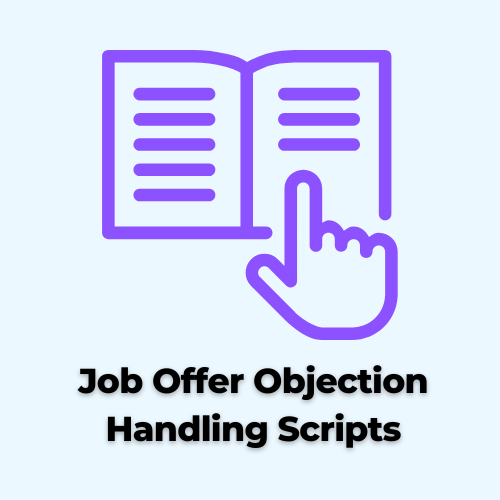
- Overcome Recruiter Pushback – Proven scripts to handle pushback and keep your salary negotiation on track.
- Communicate Effectively – Use expert responses to get recruiters to advocate for you with the compensation team.
- Get Here
Eventually, they should agree to take your counteroffer back to their team and once they do, they should come back with an improved offer.
If the recruiter returns with an updated offer that meets your personal needs and falls within the pay bands you researched, you should be ready to send an offer acceptance letter. Congrats on navigating your salary negotiation with Snowflake successfully!
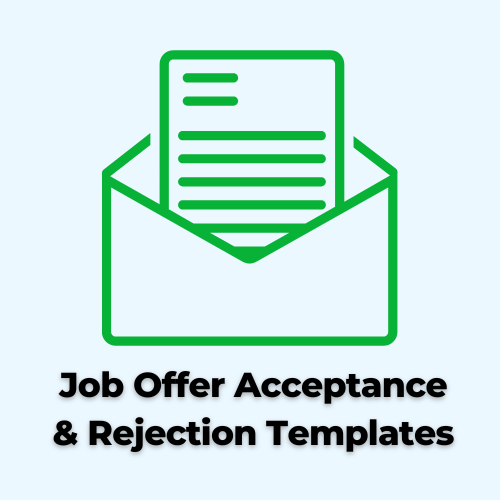
- Accept or Decline – Expert crafted job offer acceptance email and rejection email templates to share your decision.
- Professional & Genuine Tone – These help you communicate in a professional manner regardless of what you decide.
- Get Here
Mistakes to Avoid During Your Snowflake Salary Negotiation
Most of this article has been spent explaining what you should do during your negotiation. However, we want to finish by quickly outlining a few things you shouldn’t do during your Snowflake salary negotiation. Below is a list of top Snowflake salary negotiation mistakes you should make sure to avoid.
Avoid Sharing Salary Expectations Before You Get a Snowflake Job Offer
Be prepared for Snowflake recruiters to try their best to uncover your salary expectations before providing an actual offer. However, sharing your salary expectations before you have an offer in hand can actually make it more challenging to receive a better compensation package.
Let’s take a look at how this might play out in practice: Say you share a lower Snowflake salary expectation with the recruiter than what they could offer. They will then be incentivized to offer you that lower compensation or down level you. On the flip side, if you answer with a number higher than what they are able to realistically offer, they could become disinterested and decide to go with a different candidate.
So how can you avoid giving in to the recruiter’s questioning? Try responding like this. Snowflake recruiters might even try to convince you that knowing your compensation expectations can help them find a deal that works well for both you and their team. While at first that might sound like a reasonable request, don’t forget that at the end of the day Snowflake’s best interests might be in mind, not yours.
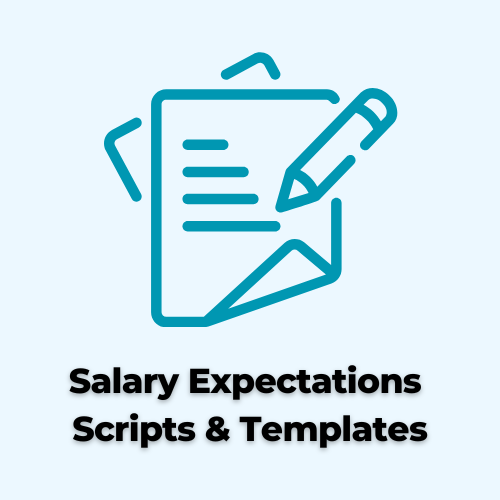
- Salary Expectation Responses – Scripts to overcome recruiter salary expectation discussions and pre offer calls.
- Avoid Lowballing Yourself – These call scripts and email templates will help you get a competitive offer.
- Get Here
It also doesn’t make much sense to go over your salary expectations before you learn more about the specific role and its benefits and whether Snowflake careers feel like a good fit to you.
Don't Be Afraid of a Snowflake Salary negotiation
Too often, career professionals shy away from negotiating because they fear losing out on the offer altogether. However, you should know that we’ve helped facilitate many successful Snowflake salary negotiations and there’s nothing to be afraid of. In all our years of experience, we’ve never seen Snowflake take back a job offer because a candidate tried to negotiate. It's generally expected, regardless of the role level—whether it’s an individual contributor role, Snowflake engineering manager salary, Snowflake director salary, or a Snowflake VP salary—you should negotiate your salary.
Don’t let any bad salary negotiation thoughts keep you from advocating for the compensation you deserve.
Be Realistic by Doing Your Research when evaluating Snowflake careers
Even though Snowflake careers pay well, and they’re known for a high Snowflake developer salary among other roles, you never want to push for unreasonable compensation. That’s why taking the time to understand each element of your Snowflake salary package and researching the pay ranges for your specific role is so essential. With the right data and insights, you should be able to come up with an appropriate ask.
Snowflake Salary Negotiation Coaching & Tools
Increasing your Snowflake compensation requires a deep understanding of the company’s compensation philosophy and the right salary negotiation strategy. Our expert Salary Negotiation Coaching will help you navigate the Snowflake salary negotiation process and secure the top end of the pay band.
Or leverage our Salary Negotiation Courses and Salary Negotiation Scripts.
 Job Offer Negotiation Course
Job Offer Negotiation Course
- Get our job offer negotiation strategies, templates, scripts, and guidance.
- Access our step-by-step lessons, compensation research guides, and tools.
- Access Now
 Raise Negotiation Course
Raise Negotiation Course
- Get our raise negotiation strategies, templates, scripts, and guidance.
- Access our step-by-step lessons, compensation research guides, and tools.
- Access Now

